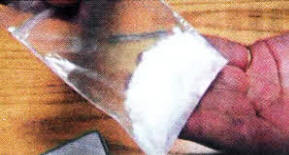Mother who lost son to another 'legal high'
pleads for a
complete ban
by MARY MAGEE
`We saw how addiction took -over our young son,' she said. `What we were most aggrieved about was there was no help out there for us as a family. I went to everyone the social services, GP but nothing. All I wanted to do was try to get help for my son.'
A LISBURN mother who believes the death of her 19-year-old son was caused by an addiction to so called legal highs has called on the government to ban all similar substances before another life is lost.
The woman's son died in October 1995 from a rare form of leukaemia, which she has been told was as a direct result of being hooked on sniffing solvents. The teenager had been an addict for five years and though he got himself off the substance and seemed to have turned his life around, he was diagnosed with leukaemia at the age of 19 and died just nine months later.
He first experimented with aerosol solvents which his mother would find in his bedroom at the age of 12 on. She said he would buy up to eight aerosol cans at a time without shop keepers ever questioning him.
As he got more hooked his mother went directly to shops to urged them not to sell him any more, but at the age of 16, her son left home and got his own flat.
He was in and out of jobs because he would get caught sniffing gas or aerosol cans. Then his life turned at the age of 17 when he stopped experimenting and got a girlfriend.
However at the age of 19, despite being off substances for two years, he became jaundiced, started to pass blood and became lethargic.
He was diagnosed in January 1995 with a rare form of leukaemia, mostly seen in the elderly, Acute Mild Elastic.
One of his brothers donated bone marrow and after a transplant at the City Hospital his family believed his problems were finally over. However, weeks after the transplant his body rejected the bone marrow and the father-of-one passed away leaving behind a nine-month-old baby.
Following the recent craze for methadrone the local woman says she would like to see all legal highs banned.
"We saw how addiction took over our young son," she said. "What we were most aggrieved about was there was no help out there for us as a family. I went to everyone the social services, GP but nothing. All I wanted to do was try to get help for my son.
"He had been a great outgoing child before his addiction but his condition caused a lot of conflict in the family. I did everything I possibly could to stop him but it was no good. We had no support - we tried and tried but then he would not admit to himself that he had a problem. We just could not get through to him that he was killing himself with solvents."
She said the recent methadrone craze had brought it home to her again the importance of an outright ban on any legal highs.
"These crazes seem to come and go," she said. "There seemed to be a craze then. I am 52 and there was a craze when I was growing up too. If other parents hear my story maybe they will be able to seek help for their child in a similar situation."
Lagan Valley sees rise in legal high patients
 THE South Eastern Trust has revealed that there has been
a rise in people attending the Lagan Valley Hospital emergency department
after taking legal highs.
THE South Eastern Trust has revealed that there has been
a rise in people attending the Lagan Valley Hospital emergency department
after taking legal highs.
A spokesperson for the Trust said approximately two or three people per week are admitted although not all those who present with symptoms admit to taking the drug.
Commenting on the use of legal highs local MLA Jonathan Craig said that he is a strong supporter of an immediate ban. "Unfortunately there is a clear rise in incidents of people using legal highs and it is not just young people, but middle aged people are using them too. They don't seem to realise they are damaging their heaiteh and will end up in hospital with the side affects.
"I an a strong supporter of outlawing legal highs. This is costing the taxpayer through the Health Service as large amounts of money are being spent treating people who take legal highs."
Mephedrone and other so-called 'legal high' drugs are to be banned within weeks. Home Secretary Alan Johnson said mephedrone, which has been connected to at least three suicides in Northern Ireland in recent weeks, will be outlawed and made a Class B drug by the end of April.
Ulster Star
02/04/2010

